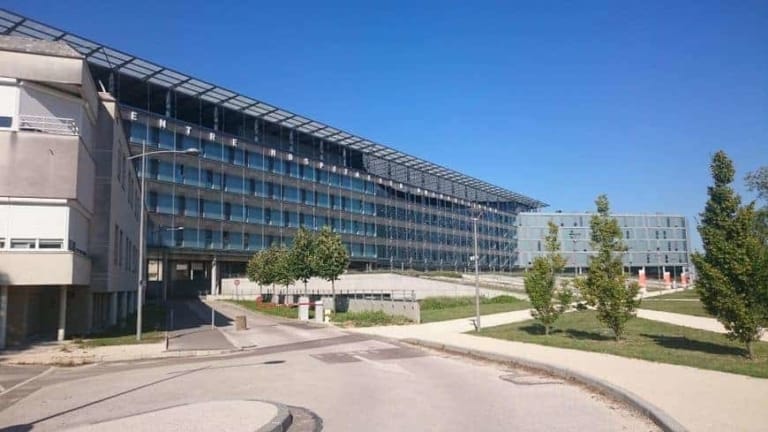
Centre de Génétique
Hôpital d’Enfants CHU
14 rue Paul Gaffarel,
BP 77908
21079 Dijon cedex
France
Lead

Pr Laurence Faivre
Telephone: +33 (0)3 80 29 53 13
Fax: 33 (0)3 80 29 32 66
Scope
The area of expertise of the Dijon Centre of the ITHACA European Reference Network (ERN) covers all syndromes exhibiting developmental anomalies and/or intellectual disability (ID). About 1/40 newborn has a congenital malformation (261/10000 fetuses and newborn following EuroCAt reports), and 1/40 has ID. Therefore, 3 to 5 % of all human births show or will develop a developmental anomaly, among which at least 25-50% are of genetic or genomic origin. This huge population represents in reality the juxtaposition of a very large number of individually rare disorders showing an extreme diversity of causes and phenotypes. The jurisdiction and scope of expertise of Dijon ITHACA Centre includes:
- over 5500 dysmorphic and multiple congenital anomaly (MCA) syndromes (listed in the London Dysmorphology Database), among which over 3000 monogenic diseases, all chromosome abnormalities (most of them only detectable through array technologies), multifactorial, sporadic dysmorphological anomalies and embryofetopathies of environmental origin
- >1500 monogenic and hundreds chromosomal forms of ID with or without associated autism spectrum disorder (ASD).
Service to patients
The regional population covered by the Dijon Centre counts more than 1.6 million inhabitants. The HCP is the only hospital of the Burgundy region with a genetics department. Its implication in the field of rare diseases has been boosted by the vitality of the genetics team, and besides the CLAD-Est, departments of the hospital coordinate 48 knowledge CRRD, all belonging to a Federation for rare diseases. The HCP offers full coverage of general care for children and pregnant women, in particular.
Organization of the ITHACA ERN – Dijon Centre
Dijon Reference Center for developmental diseases organizes genetic diagnosis, familial screening, genetic counseling, prenatal diagnosis, follow-up and care of children and with developmental disorders and ID, as well as teaching and research. The center also offers neurocognitive and developmental evaluation, closely with medicosocial structures in charge of care of patients, as well as education structures. A center for functional diagnosis of ID has been set up and is fully integrated with the Genetics Unit, as is the Child Psychiatry Department, which offers multidisciplinary diagnostic procedures and care for ID children. There are strong interactions with the reference centre for children with autistic spectrum disorders, and the reference centre for speech disturbances. Full technical support exists, including diagnostic whole exome sequencing (WES) to patients with undiagnosed developmental anomalies or a possible diagnosis with extreme genetic heterogeneity.
The reference center is closely linked to the GAD research team (www.gad-bfc.org). GAD’s main objectives include:
- Identification of the molecular bases of rare Mendelian genetic diseases with developmental disorders, with a particular interest in mosaic disorders with skin manifestations, Cohen syndrome, oral-facial-digital syndromes, marfanoid syndromes with or without ID, and syndromes with fronto-nasal dysplasia
- Understanding the pathophysiology of certain development diseases
- Setting up genomic medicine in developmental disorders
At the regional level, the team also coordinates the FHU-TRANSLAD (www.translad.org), a Hospital-University Federation (project of excellence) devoted to the development of care, research and teaching/training in the field of development diseases. In a context in which rare diseases are a national and European priority, the recent development of next generation sequencing in genetics, is currently transforming perspectives for research in a radical manner, as well as opening up new avenues in the diagnosis and therapeutic management of these diseases. FHU-TRANSLAD is an original, innovative project, with international scope and organized for the benefit of patients and their families. The aim is to answer questions that existing facilities cannot answer individually. These questions concern personalized diagnosis and management. It was conceived following an analysis of patients’ needs and because of organizational imperatives caused by the emergence of innovative technologies. It will facilitate the transition from research to care so that patients will be able to benefit more quickly from innovative technologies. It contributes to the development of therapeutic strategies and the diffusion of knowledge of these to students, professionals, and more widely to the general public. FHU-TRANSLAD also brings to light the societal and economic implications of genetics and personalised medicine, and fosters the emergence of public debate on the ethical issues raised by the introduction of these new care technologies. The team plays an important role in teaching bioinformatics applied to NGS and has developed a university diploma.
At the national level, the team coordinates the French network for developmental disorders (AnDDI-Rares), gathering clinicians, biologists and patients support groups working on developmental disorders (www.anddirares.org).
